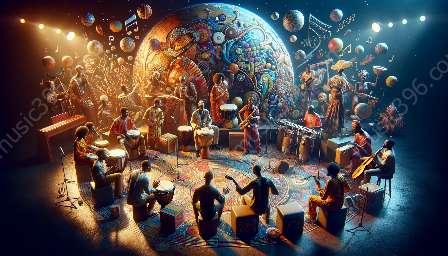Fusion music collaborations have a unique ability to bridge cultural divides and foster cross-cultural understanding. When musicians from diverse backgrounds come together to create music, they not only blend different musical styles but also exchange cultural elements, leading to a rich and dynamic musical landscape. This topic cluster will delve into the impact of fusion music collaborations on cross-cultural understanding, exploring how these collaborations contribute to diversity, inclusivity, and global harmony.
A Brief Overview of Fusion Music
Fusion music is a genre that combines elements of different musical traditions to create a new, diverse sound. It often involves blending various musical styles, such as jazz, rock, electronic, traditional, and world music, to produce innovative compositions. Fusion music is not confined to any specific cultural or geographical boundaries, making it an excellent platform for cross-cultural collaboration.
Breaking Barriers through Cross-Genre Collaborations
One of the most significant impacts of fusion music collaborations is the breaking down of cultural and musical barriers. When musicians from diverse backgrounds collaborate, they bring their unique cultural influences and musical styles into the mix, creating a fusion of sounds that transcends traditional genre categorizations. This cross-genre approach challenges preconceived notions about musical boundaries and encourages open-mindedness and acceptance of diverse musical expressions.
Celebrating Diversity and Inclusivity
Fusion music collaborations celebrate diversity and inclusivity by recognizing the value of different cultural perspectives. These collaborations highlight the beauty of cultural exchange and promote a sense of unity and collective appreciation for global music traditions. By integrating elements of various music genres and cultural practices, fusion music collaborations honor the richness and diversity of the global music landscape.
Impact on Cross-Cultural Understanding
Collaborations between musicians from diverse backgrounds contribute significantly to cross-cultural understanding. As they work together to create music, they engage in a process of cultural exchange and mutual respect, leading to greater understanding and appreciation of each other's cultural heritage. This exchange extends beyond the realm of music, fostering broader cross-cultural dialogue and empathy among communities worldwide.
Championing Global Harmony
Through fusion music collaborations, musicians become ambassadors of global harmony, promoting peace and understanding through their shared artistic expression. Their collaborations serve as a powerful example of how diverse cultures can come together harmoniously, transcending language barriers and geographical boundaries. This collective effort in the music industry sets a positive precedent for fostering mutual respect and appreciation among people from different cultural backgrounds.
Real-Life Examples of Fusion Music Collaborations
There are numerous real-life examples of fusion music collaborations that have made a significant impact on cross-cultural understanding. Artists such as Anoushka Shankar, a renowned sitar player who seamlessly blends Indian classical music with contemporary genres, and Yo-Yo Ma, a celebrated cellist who collaborates with musicians from various cultural traditions, exemplify the power of fusion music in fostering cross-cultural understanding.
Conclusion
Fusion music collaborations play a vital role in promoting cross-cultural understanding by embracing diversity, breaking barriers, and championing global harmony. As musicians from diverse backgrounds come together to create innovative and inclusive music, they inspire greater empathy, mutual respect, and appreciation for the richness of global music traditions. These collaborations serve as a testament to the unifying power of music and its ability to transcend cultural differences, contributing to a more interconnected and harmonious world.












































